The next generation
and Wightwick Manor
Another Midlands industrialist in Parliament at the same
time as Stanley Baldwin was Geoffrey Mander of Wightwick
Manor, (Liberal MP for East Wolverhampton from 1929-45).
Wightwick (built in 1887, extended 1893) had been
decorated with many Morris and Company wallpapers and
fabrics by Geoffrey's parents, Theodore and Flora Mander.
Geoffrey had business connections with the Baldwins;
Mander's paints and varnishes supplied the cream and
chocolate brown colours for the carriages of the Great
Western Railway, whose Chairman from 1905 was Alfred
Baldwin.
Stanley Baldwin described Geoffrey Mander as a 'personal
friend' in a speech he made when launching the General
election campaign of 1935 in Wolverhampton. Referring to
Geoffrey's reputation as a tenacious questioner in the
Commons, Baldwin remarked, to laughter, that he was:
"one in whom all the inquisitiveness of the Manders for
the last 20 generations is centred......my first duty
every morning is to look at the Order paper and run
through the questions and if there be something over
which I have tried to draw a curtain of reserve and
decency, Geoffrey Mander will tear it on one side and he
will tread, honestly and conscientiously, on every corn
from China to Peru."
Geoffrey Mander often visited Baldwin in Bewdley after
his retirement, furnishing him with the latest
Westminster news and gossip. On one visit, when
discussing Baldwin's Macdonald mother and aunts, the
former Prime Minister revealed his parents double
wedding at St. Peter's, Wolverhampton, would have been a
triple wedding, but for Fred's illness. (This doesn't
explain Fred's attendance in Wolverhampton and his
wedding immediately after in Burslem though). Possibly a
more reliable memory of the wedding he passed on was
that the Macdonalds travelled to church in a coach with
postillions, which he (Baldwin) found astonishing
considering their 'humble home'.
Another interesting story recorded by Geoffrey Mander
after a visit to Bewdley was that 'William Morris was
standing, laying down the law in his vigorous way to
some of his friends when Val Princep came up to him from
behind and....struck him a heavy blow....Morris paused
in his flow of rhetoric for a moment and without looking
round said, "don't do it, Janey". This afterwards became
a standing joke in the Baldwin family and the sentence
was used whenever it could be appropriately....applied'.
Geoffrey Mander continued his friendship with the
Baldwins after Stanley's death in 1948. A letter to him
from Arthur, the 3rd Earl (Stanley's second son),
begins: 'I am so glad you like reading about the
Macdonald sisters.......it was easy for me to see when I
visited your house where some, at least, of your
interests lay. It is not a book for the many, nor I
suppose for the present generation; only a handful of
the likes of us.' Baldwin goes on to illustrate the low
regard given at the time (1960) to the Pre-Raphaelites
and the Victorian period in general, by quoting phrases
made by an art critic in 1957: 'If such a person as the
Pre-Raphaelite enthusiast still exists' and 'this
muddle-headed, rapt, but often vulgar movement'.
(The details included in the preceding four paragraphs
were kindly supplied by Pat Pegg, whose biography of
Geoffrey Mander is yet to be published).
A Cedar tree, in memory of Stanley Baldwin, was planted
by the third Earl in 1959 on the South Terrace at
Wightwick Manor. |
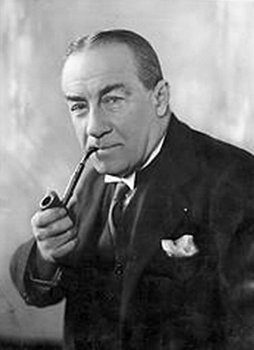
Stanley Baldwin, 1st Earl Baldwin of
Bewdley. |
|
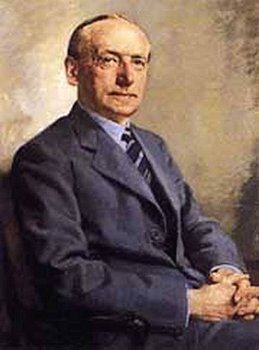
Geoffrey Mander by Clarence White,
1930. |
After Geoffrey Mander had given Wightwick Manor to
the National Trust in 1937, he and his second wife
Rosalie Mander began assembling the Pre-Raphaelite
picture collection, acquiring pieces in the 1930s and
'40s from the artists descendents, such as Rossetti's
niece, Millais's grandson and Morris's daughter May, who
visited Wightwick and embroidered some bed hangings for
the Manders. Angela Thirkell, Burne-Jones's
granddaughter visited in the 1940s; her son Lance
Thirkell, worked in Wightwick's garden during World War
II. The Manders enhanced the collection at Wightwick by
the purchase of more Morris and Co. pieces, Kelmscott
Press books, De Morgan ware, embroidery and watercolours
by May Morris and many other items associated with
Morris and the Pre-Raphaelite circle. Sir Geoffrey
Mander died in 1962 (he received a knighthood in 1945
after turning down a peerage). Rosalie, Lady Mander
continued to develop the Pre-Raphaelite collection until
her death in 1988, it has subsequently been enhanced by
bequests and the National Trust.
The Wightwick picture collection contains a watercolour
of Haight Barn, near Rottingdean, by Philip Burne-Jones
as well as sketches by Poynter and many Rossetti
drawings, including one of Maria Zambaco from 1871.
There are sketches and drawings by Edward Burne-Jones,
several of his chalk drawings of women, including what
is probably a late 1860s study of Zambaco. The centre
piece of the collection is Edward Burne-Jones's oil
painting 'Love Among The Ruins' featuring Maria Zambaco
as the female model. |
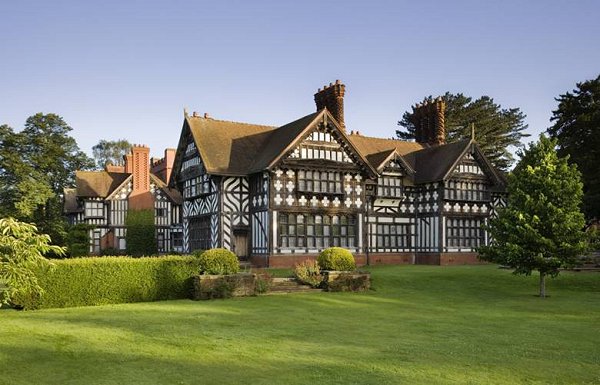
Wightwick Manor, Wightwick, Wolverhampton.
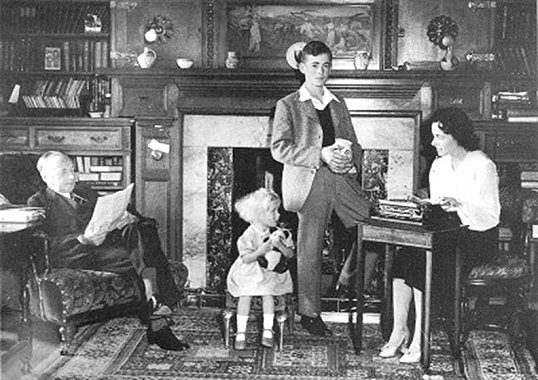
Sir
Geoffrey Mander, daughter Anthea, son John and Rosalie,
Lady Mander in the Library at Wightwick about 1948. |
Bibliography
A Circle of Sisters, Judith Flanders, 2001.
Victorian Sisters, Ina Taylor, 1987.
A Persistent Thorn, Geoffrey Mander MP, 1929-45,
Patricia Pegg, unpublished.
The Pre-Raphaelite Sisterhood, Jan Marsh, 1985.
Ellen's Forgotten Mercia, Anthony Perry, 1999.
Sources of photographs
Wolverhampton As It Was, John Roper, 1975.
Wolverhampton Past and Present, Wolverhampton Heritage,
1985.
The Book of Wolverhampton, Frank Mason, 1979.
Mapping the Past - Wolverhampton 1577-1986, Mary Mills,
1993.
www.wolverhamptonarchives.dial.pipex.com
www.localhistory.scit.wlv.ac.uk
www.wikipedia.org
|
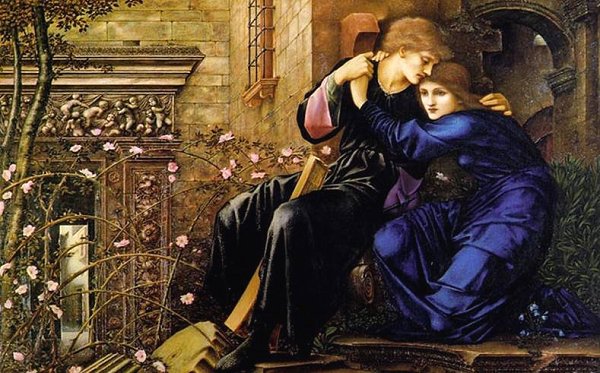
Love Among the Ruins by Edward Burne-Jones,
1894. (Wightwick Manor).
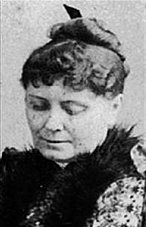
Alice Kipling aged 53 in 1890. |
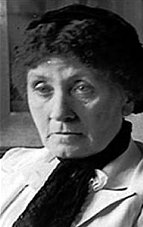
Lady Burne-Jones at sixty in 1900. |
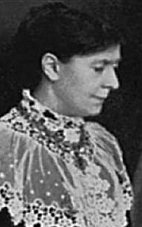
Louisa Baldwin in the early 20th Cent. |
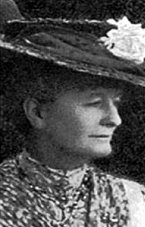
Lady Poynter in her 50's in the 1890s. |
 |
|
 |
Return to
Postscript |
|
Return to
the beginning |
|